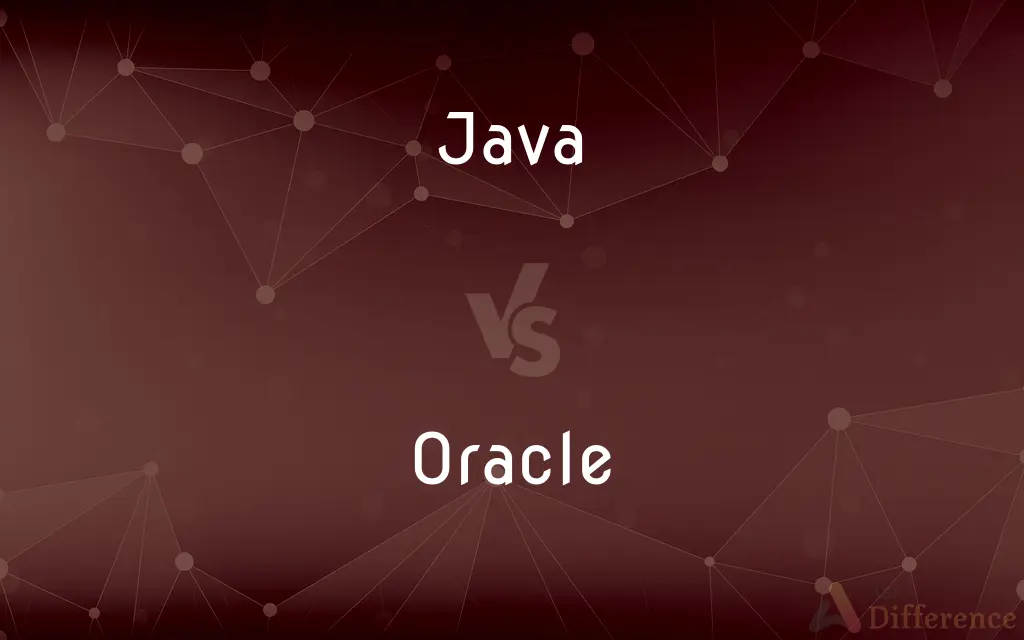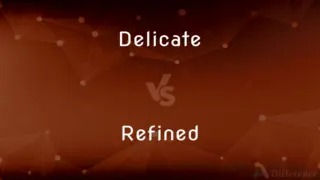Java vs. Oracle — What's the Difference?
Edited by Tayyaba Rehman — By Fiza Rafique — Updated on May 2, 2024
Java is a popular programming language used for building applications across various platforms, whereas Oracle primarily refers to Oracle Corporation, a major tech company known for its database products and software solutions.

Difference Between Java and Oracle
Table of Contents
ADVERTISEMENT
Key Differences
Java is a programming language developed initially by Sun Microsystems, which allows developers to write once, run anywhere (WORA), meaning that Java code can run on all platforms that support Java without the need for recompilation. On the other hand, Oracle Corporation is a multinational computer technology corporation specializing in developing and marketing database software and technology, cloud engineered systems, and enterprise software products.
Java's architecture-neutral nature has made it a favorite choice for developers for applications on mobile, web, and enterprise levels because of its robustness, security, and portability. In contrast, Oracle's products are integral to running enterprise-grade database systems, and their software is used extensively in corporate environments that require complex data management capabilities.
Oracle acquired Sun Microsystems in 2010, bringing Java under its umbrella. This acquisition allowed Oracle to significantly influence the development and management of Java, integrating it with its other software and hardware systems. Whereas Oracle as a corporation has a broader focus, including a suite of cloud solutions, database technologies, and enterprise applications.
Java is used widely in Android mobile development, web applications, and software tools, offering a vast ecosystem of libraries and frameworks, which fosters a strong community of developers. Meanwhile, Oracle is a key player in the enterprise IT environment, providing solutions such as Oracle Database, middleware, and business applications like Oracle ERP, which are essential for large-scale operations.
Licensing and community involvement also differ significantly; Java has its development led by the Oracle-led OpenJDK community, with free and commercial use licenses available, which promotes widespread use and contribution from a global developer community. Oracle's products, on the other hand, are often proprietary with licensing fees, aimed at providing robust support and extensive functionality for enterprise users.
ADVERTISEMENT
Comparison Chart
Type
Programming language
Technology corporation
Primary Use
Application development across platforms
Enterprise database and software solutions
Founded/Developed
Developed by Sun Microsystems in 1995
Founded in 1977
Ownership
Acquired by Oracle Corporation in 2010
Independent company
Key Products
Java Development Kit (JDK), Java Runtime Environment (JRE)
Oracle Database, Oracle Cloud, Oracle ERP
Community
OpenJDK, widespread developer community
Enterprise customers, professional services
License
Free and commercial licenses available
Mostly proprietary with licensing fees
Compare with Definitions
Java
Known for its cross-platform capabilities, following the principle of write once, run anywhere.
Java applications can be developed on one platform and deployed across many others without modification.
Oracle
An American multinational computer technology corporation.
Oracle is renowned for its comprehensive database management systems.
Java
Managed and licensed under the Oracle-led OpenJDK.
Developers can contribute to the Java development through the OpenJDK project.
Oracle
Proprietary licensing model with a focus on enterprise users.
Oracle licenses its software products to businesses with varying scale and needs.
Java
A high-level, class-based, object-oriented programming language.
Java is widely used in Android app development.
Oracle
An oracle is a person or agency considered to provide wise and insightful counsel or prophetic predictions, most notably including precognition of the future, inspired by deities. As such, it is a form of divination.
Java
Java (Indonesian: Jawa, Indonesian pronunciation: [ˈdʒawa]; Javanese: ꦗꦮ; Sundanese: ᮏᮝ) is one of the islands of the Greater Sunda Islands in Indonesia, bordered by the Indian Ocean to the south and the Java Sea on the north. With a population of 147.7 million (Java only) or 151.8 million (including the inhabitants of its surrounding islands, principally Madura), Java constitutes 56.1 percent of the Indonesian population and is the world's most-populous major island.
Oracle
A priest or priestess acting as a medium through whom advice or prophecy was sought from the gods in classical antiquity.
Java
A general-purpose computer programming language designed to produce programs that will run on any computer system.
Oracle
A response or message given by an oracle, especially an ambiguous one.
Java
A large island in the Malay Archipelago, forming part of Indonesia; population 120,000,000 (est. 2008) (with Madura).
Oracle
A shrine consecrated to the worship and consultation of a prophetic deity, as that of Apollo at Delphi.
Java
Brewed coffee.
Oracle
A person, such as a priestess, through whom a deity is held to respond when consulted.
Java
A blend of coffee imported from the island of Java.
Oracle
The response given through such a medium, often in the form of an enigmatic statement or allegory.
Java
Coffee in general.
Oracle
A person considered to be a source of wise counsel or prophetic opinions.
Java
A dance popular in France in the early 20th century.
Oracle
An authoritative or wise statement or prediction.
Java
One of the islands of the Malay Archipelago belonging to the Netherlands.
Oracle
A command or revelation from God.
Java
Java coffee, a kind of coffee brought from Java.
Oracle
In the Bible, the sanctuary of the Temple.
Java
An object-oriented computer programming language, derived largely from C++, used widely for design and display of web pages on the world-wide web. It is an interpreted language, and has been suggested as a platform-independent code to allow execution of the same progam under multiple operating systems without recompiling. The language is still (1997) under active development, and is evolving.
Oracle
A shrine dedicated to some prophetic deity.
Java
An island in Indonesia south of Borneo; one of the world's most densely populated regions
Oracle
A person such as a priest through whom the deity is supposed to respond with prophecy or advice.
Java
A beverage consisting of an infusion of ground coffee beans;
He ordered a cup of coffee
Oracle
A prophetic response, often enigmatic or allegorical, so given.
Java
A simple platform-independent object-oriented programming language used for writing applets that are downloaded from the World Wide Web by a client and run on the client's machine
Oracle
Something said that must come true or cannot be countermanded; an inexorable command or declaration.
Java
Supports multithreading and is also noted for its security features.
Java is commonly used in financial institutions for its robust security.
Oracle
A person considered to be a source of wisdom.
A literary oracle
Java
Java Virtual Machine (JVM) enables Java applications to run on different operating systems.
JVM interprets compiled Java binary code into a platform's machine language.
Oracle
A wise sentence or decision of great authority.
Oracle
A fortune-teller.
Oracle
One who communicates a divine command; an angel; a prophet.
Oracle
(Jewish antiquity) The sanctuary, or most holy place in the temple; also, the temple itself.
Oracle
(computing theory) A theoretical entity capable of answering some collection of questions.
Oracle
(cryptocurrencies) A third-party service that provides smart contracts with information from the outside world.
Oracle
(obsolete) To utter oracles or prophecies.
Oracle
The answer of a god, or some person reputed to be a god, to an inquiry respecting some affair or future event, as the success of an enterprise or battle.
Whatso'er she saith, for oracles must stand.
Oracle
The deity who was supposed to give the answer; also, the place where it was given.
The oracles are dumb;No voice or hideous humRuns through the arched roof in words deceiving.
Oracle
The communications, revelations, or messages delivered by God to the prophets; also, the entire sacred Scriptures - usually in the plural.
The first principles of the oracles of God.
Oracle
The sanctuary, or Most Holy place in the temple; also, the temple itself.
Siloa's brook, that flow'dFast by the oracle of God.
Oracle
One who communicates an oracle{1} or divine command; an angel; a prophet.
God hath now sent his living oracleInto the world to teach his final will.
Oracle
Any person reputed uncommonly wise; one whose decisions are regarded as of great authority; as, a literary oracle.
The country rectors . . . thought him an oracle on points of learning.
Oracle
A wise pronouncement or decision considered as of great authority.
Oracle
To utter oracles.
Oracle
An authoritative person who divines the future
Oracle
A prophecy (usually obscure or allegorical) revealed by a priest or priestess; believed to be infallible
Oracle
A shrine where an oracular god is consulted
Oracle
Offers a suite of software solutions including databases, cloud computing, and enterprise software.
Oracle's flagship product is the Oracle Database, which offers advanced data management.
Oracle
Provides integrated cloud applications and platform services.
Oracle Cloud offers SaaS, PaaS, and IaaS services to businesses.
Oracle
Known for high-performance and scalable enterprise solutions.
Oracle ERP is widely used for integrating complex business processes.
Common Curiosities
Can Java be used independently of Oracle products?
Yes, Java is a general-purpose programming language that can be used independently of Oracle's other products.
What are the benefits of using Oracle's solutions in a business?
Oracle provides robust, scalable, and integrated solutions that are ideal for large-scale and complex business operations requiring reliable data management and business process integration.
What is Java mainly used for?
Java is used for building applications for web, mobile, and desktop platforms.
How does Java integrate with Oracle’s products?
Java is often used to develop applications that run on Oracle's platforms or interact with Oracle databases.
What's the contrast between "Java" and "Oracle"?
One's about programming, the other's about databases.
What's the distinguishing factor between "Java" and "Oracle"?
Java's for writing applications, Oracle's for managing information.
What is Oracle known for?
Oracle is best known for its database software and technology, cloud engineered systems, and enterprise software products.
Can you clarify "Java" versus "Oracle"?
Java's for coding logic, Oracle's for storing and retrieving data.
How do you discern "Java" from "Oracle"?
Java's about algorithms, Oracle's about queries.
What's the distinction between "Java" and "Oracle"?
Java's for building, Oracle's for storing.
What sets "Java" apart from "Oracle"?
Java's for software development, Oracle's for data handling.
Share Your Discovery

Previous Comparison
Serial vs. Sequence
Next Comparison
Delicate vs. RefinedAuthor Spotlight
Written by
Fiza RafiqueFiza Rafique is a skilled content writer at AskDifference.com, where she meticulously refines and enhances written pieces. Drawing from her vast editorial expertise, Fiza ensures clarity, accuracy, and precision in every article. Passionate about language, she continually seeks to elevate the quality of content for readers worldwide.
Edited by
Tayyaba RehmanTayyaba Rehman is a distinguished writer, currently serving as a primary contributor to askdifference.com. As a researcher in semantics and etymology, Tayyaba's passion for the complexity of languages and their distinctions has found a perfect home on the platform. Tayyaba delves into the intricacies of language, distinguishing between commonly confused words and phrases, thereby providing clarity for readers worldwide.
















































